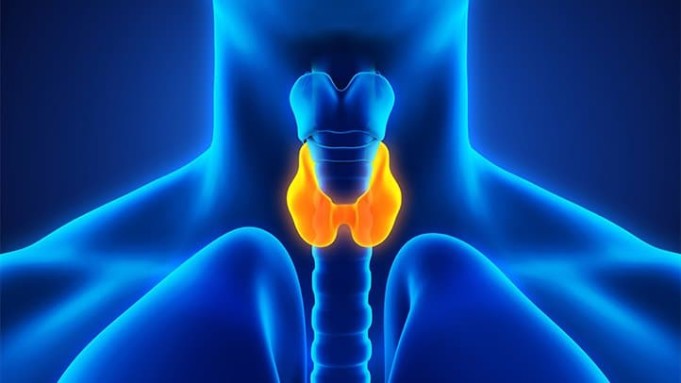The thyroid gland is an endocrine (ductless) gland that is located around the neck just in front of the Adam’s Apple just below the throat cartilage. The thyroid gland produces thyroid hormones(T3, T4, and calcitonin) which regulates the metabolic rate of the body i.e. the way the body uses energy as well as regulates protein synthesis in the body.
The major hormones produced by the thyroid gland are T3 and T4 which aids in the regulation of the heart rate by controlling the contraction and relaxation of the heart valves and likewise the digestive system of the body by regulating how fast the intestines are able to process and break down food.
The thyroid uses iodine synthesized from the food we eat to produce these hormones. It is very important that these thyroid hormones are regulated properly and adequately managed (i.e. they can’t be too high or too low) as these would pose health problems if they are very high or if they are very low.
The hypothalamus in the brain and also the pituitary gland also found in the brain communicate with the thyroid gland to help maintain the balance of these hormones.
When there is a low level of either T3(Triiodothyronine) or T4(Thyroxine) in the blood, the hypothalamus produces Thyrotrophin-releasing hormone(TSH- releasing hormone) to signal the pituitary gland to release TSH which in turn will alert the thyroid gland to start or increase the production of T3 or T4.
And likewise in a case where is a high level of secretion in the bloodstream, the hypothalamus is alerted and therefore will inhibit the production of TSH- releasing hormone. This will then inhibit the production of TSH by the pituitary gland and which in turn inhibit the production of either T3 or T4 by the thyroid gland.
Did you know?
- That all your body cells actually depend on the thyroid hormones for the regulation of their metabolism (the way the cells absorb energy). This simply means that without the presence of these hormones, each of the cells in our body would begin to malfunction because it’s either they receive too much energy and go into hyperactivity or they receive too little and are too weak to function. Now, don’t you think these hormones are very important too?
- That Only the Thyroid cells are highly specialized to absorb and utilize the iodine gotten from the ingestion of your food?
- That your Thyroid also produces calcitonin (although at a lesser rate) which is responsible for controlling the level of blood calcium in the body?
- That depression could be a sign of a low amount of the thyroid hormone (I.e hypothyroidism) present in the bloodstream?
- That insomnia (sleep deprivation) is an effect of hyperthyroidism?
When there is an abnormal increase in the level of the Thyroid hormones in the blood, it is known as hyperthyroidism and when there is an abnormal decline in the level of thyroid hormones in the blood, it is known as hypothyroidism.
There are several disease or disorders that originate from a dysfunction of the Thyroid gland but most of them can be due to this four causes:
- Hyperthyroidism
- Hypothyroidism
- Cancer of the Thyroid gland
- Lumps found within the Thyroid gland
Some thyroid disorders or diseases include:
Goiters
This is characterized by a big bulge in the neck and there are two different types of goitres namely
- Toxic or poisonous goitres: which is caused by hyperthyroidism I.e the increased secretion of the thyroid hormones.
- Non- Toxic Goiters: which is caused by iodine deficiency (very reduced concentration of iodine in the blood).
Hypothyroidism
This occurs as a result of a very low amount of secretion of the thyroid hormone. In babies, this condition is seen as cretinism. This condition comes with very serious defects including bone malformation and likewise mental retardation.
For an adult having hypothyroidism, the adult will often time be very sensitive to cold, have a low appetite and suffer from overall sluggishness.
Lumps in the thyroid
These are also a common occurrence such that it has been estimated that majority of the U.S. population at least have a nodule in their thyroid gland.
Thyroiditis
This is the inflammation or swelling of the thyroid gland and its also associated with hyperthyroidism.
Hashimoto’s disease
Funny name, isn’t it? But indeed this disorder that usually causes hypothyroidism among the entire U.S population. This occurs when the patients’ immune system starts to attack its very own thyroid gland including the ability of the hormones produced and likewise the number of hormones produced.
The most common symptoms and signs experienced when a person is having this disease include severe fatigue or tiredness, weight gain though it would be mild, dry hair and skin, severely enlarged goitre etc. This disease, for now, has no cure yet but researches are being carried out.
Grave’s disease
It is the exact opposite of Hashimoto’s disease. It commonly causes hyperthyroidism. Although like in the case of Hashimoto’s disease, it is caused when the patient’s immune system begins to attack the person’s thyroid gland but in this case, though, it causes an increased production of the thyroid hormone more than the normal level of production.
Signs and symptoms experienced by a person suffering from Grave’s disease include extreme tiredness or fatigue, anxiety and hyperactivity, tremors(severe and an uncontrollable shaking) experienced in the upper limbs most especially in the hands, excessive perspiration or sweating, sleeping disorders, excessive bowel movements, and also impaired vision.
In conclusion
The Thyroid gland is a very important gland and the significance cannot be overemphasized. This happens to be the only gland that can make use of the iodine found in your food and all our body cells depend on the hormones they produce.












